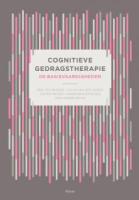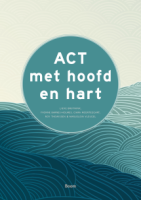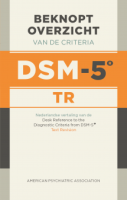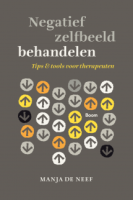Inhoud
Zijn de resultaten van randomized clinical trials (RCT’s) naar de effectiviteit van cognitieve gedragstherapie generaliseerbaar naar de klinische praktijk?
Samenvatting
Cognitieve gedragstherapie is de eerste keus behandeling voor veel stoornissen. Deze richtlijnen zijn in belangrijke mate gebaseerd op de resultaten van randomised clinical trials (RCT's). Hoewel RCT's als de gouden standaard beschouwd worden, gaat het bij RCT's vaak om efficacy trials in plaats van effectiveness trials. In dit artikel wordt besproken in hoeverre de resultaten uit gerandomiseerde efficacy studies generaliseerbaar zijn naar de klinische praktijk. Resultaten van effectiviteitsonderzoek in de klinische praktijk (‘Benchmark studies') laten over het algemeen positieve resultaten voor psychologische behandelingen zien, maar de effecten zijn doorgaans iets minder gunstig dan in efficacy trials. Een overzicht van recente RCT's in Behaviour Research & Therapy en Behavior Therapy laat zien dat in de meeste RCT's patiënten worden behandeld die vaak gekenmerkt worden door comorbide stoornissen. Ook het beeld dat therapeuten in RCT's hoogopgeleide en streng gesuperviseerde behandelaars zijn dient op grond van dit overzicht bijgesteld te worden. De modale therapeut in de meeste RCTs heeft zeker niet meer ervaring dan de gemiddelde behandelaar in de GGZ.
Literatuur
- Bhar, S.S., & Beck, A.T. (2009). Treatment integrity of studies that compare shortterm psychodynamic psychotherapy with cognitive-behavior therapy. Clinical Psychology: Science & Practice, 16, 370–378.
- Barber, J.P., Sharpless, B.A., Klosermann, S., & McCarthy, K.S. (2007). Assessing intervention competence and its relation to therapy outcome: A selected review derived from the outcome literature. Professional Psychology: Research & Practice, 38, 493-500
- Barkham, M., Stiles, W.B., Connell, J., Twigg, E., Leach, C., Lucock, M., Mellor-Clark, J., Bower, P., King, M., Shapiro, D.A., Hardy, G.E., Greenberg, L., & Angus, L. (2008). Effects of psychological therapies in randomized trials and practice-based studies. British Journal of Clinical Psychology, 47, 397-415.
- Bartak, A, Spreeuwenberg, M.D., Andrea H., Busschbach, J.J., Croon, M.A., Verheul, R., Emmelkamp, P.M., & Stijnen, T. (2009). The use of propensity scores in psychotherapy research: A practical application. Psychotherapy & Psychosomatics, 78, 26-34.
- Bartak, A., Spreeuwenberg, M.D., Andrea, H., Holleman, L., Rijnierse, P., Rossum, B.V., Hamers, E.F.M., Meerman, A.M.M.A., Aerts, J. Busschbach, J.J., Verheul R, Stijnen, T., & Emmelkamp, P.M.G. (2010a). Effectiveness of different modalities of psychotherapeutic treatment for patients with Cluster C personality disorder: Results of a large prospective multicentre study. Psychotherapy & Psychosomatics, 79, 20-30.
- Bartak, A., Andrea, H., Spreeuwenberg, M.D., Ziegler, U.M., Dekker, J., Rossum, B.V., Hamers, E.F., Scholte, W., Aerts, J. Busschbach, J.J ., Verheul, R., Stijnen, T., & Emmelkamp, P.M.G. (2011a). Effectiveness of outpatient, day hospital, and inpatients psychotherapeutic treatment for patients with Cluster B personality disorders. Psychotherapy & Psychosomatics, 80, 28-38.
- Bartak, A., Andrea, H., Spreeuwenberg, M.D., Thunnissen, M., Ziegler, U.M.,Dekker, J., Bouvy, F., Hamers, E.F.M., Meerman, A.M., Busschbach, J.J.,Verheul, R., Stijnen, T. & Emmelkamp, P.M.G. (2011b). Patients with Cluster A personality disorders in psychotherapy: An effectiveness study. Psychotherapy & Psychosomatic, 80, 88–99.
- Berger, T., Caspar, F., Richardson, R., Kneubuhler, B., Sutter, D., & Anderson, G. (2011). Internet-based treatment of social phobia: A randomized controlled trial comparing unguided with two types of guided self-help. Behaviour Research & Therapy, 49, 158169.
- Blatt, S.J., Sanislow, C.A., Zuroff, D.C., & Pilkonis, P.A. (1996). Characteristics of effective therapists: Further analysis of data from the NIMH treatment of depression collaborative research program. Journal of Consulting & Clinical Psychology, 64, 1276-1284.
- Carlbring, P., Maurin, L., Törngren, C., Linna, E., Eriksson, T., Sparthan, E., Stráát, M., Marquez von Hage, C., Bergman-Nordgren, L. & Andersson, G. (2011). Individually tailored, Internet-based treatment for anxiety disorders: A randomized controlled trial. Behaviour Research & Therapy, 49, 18-44.
- Chambless, D.L., & Hollon, S D. (1998). Defining empirically supported therapies. Journal of Consulting and Clinical Psychology, 66, 7–18.
- Chambless, D.L., & Ollendick, T.H. (2001). Empirically supported psychological interventions: Controversies and evidence. Annual Review of Psychology, 52, 685-716.
- Chrits-Christoph, P., & Mintz, J. (1991). Implications of therapist effects for the design and analysis of comparative studies of psychotherapies. Journal of Consulting & Clinical Psychology, 59, 20-26.
- Cohen, S., O'Leary, K.D., & Foran, H. (2010). A randomized clinical trial of a brief, problem focused couple therapy for depression. Behavior Therapy,
- Craigie, M.A. & Nathan, P. (2010). A Nonrandomized effectiveness comparison of Broad Spectrum Group CBT to Individual CBT for depressed outpatients in a community mental health setting. Behavior Therapy, 40, 302-314.
- Davis, L., Barlow, D.H., & Smith, L. (2010). Comorbidity and the treatment of principal anxiety disorders in a naturalistic sample. Behavior Therapy, 41, 296-305.
- Emmelkamp, P.M.G., Benner, A., Kuipers, A., Feiertag, G., Koster, H.C. & van Apeldoorn, F. (2006). Comparison of brief dynamic and cognitive-behavioural therapies in avoidant personality disorder. British Journal of Psychiatry, 189, 60-64.
- Emmelkamp, P.M.G., & Vedel, E. (2010). Psychologische behandelingen: effectiviteit en gemeenschappelijke factoren. Directieve Therapie, 30,113-126.
- Farrell, L.J., Schlup, B., & Boschen, M.J. (2010). Cognitive-behavioral treatment of childhood obsessive-compulsive disorder in community-based clinical practice: clinical significance and benchmarking against efficacy. Behaviour Research & Therapy , 48, 409-417
- Godfrin, K.A., & Heeringen, C. (2010). The effects of mindfulness-based cognitive therapy on recurrence of depressive episodes, mental health and quality of life: A randomized controlled study. Behaviour Research & Therapy, 48, 738-747.
- Howard, K.I., Moras, K., Bril, P.L., Martinovich, Z., & Lutz, W. (1996). Efficacy, effectiveness, and patient progress. American Psychologist, 51, 1059-1064.
- Ingram, R.E., Hayes, A., & Scott, W. Empirically supported treatments: A critical analysis. In C.R. Snyser & R.E. Ingram (red), Handbook of Psychological Change: Psychotherapy proceses & practices for the 21st century, pp. 40-60. New York: Wiley.
- Kooiman, K. (2008). Drop-out onder patiënten in klinische psychotherapie voor persoonlijkheidspathologie. Tijdschrift voor Psychotherapie, 34, 103-115.
- Lambert, M.J., Whipple, J. L., Hawkins, E. J., Vermeersch, D.A., Nielsen, S.L., & Smart, D. W. (2003). Is it time for clinicians to routinely track patient outcome? A meta-analysis. Clinical Psychology: Science and Practice, 10, 288–301.
- Lau, W., Kwok-ying Chan, C., Ching-hong, J., & Kit-fong Au, T. (2010). Effectiveness of group cognitive-behavioural treatment for childhood anxiety in community clinics. Behaviour Research & Therapy, 48, 1067-1077.
- Liber, J.M., McLeod, B.D., Widenfeldt, B.M. van, Goedhart, A.W., Leeden, A.J.M. van der, Utens, E.M.W.J., & Treffers, P.D.A. (2010). Examining the relation between the therapeutic alliance, treatment adherence, and outcome of cognitive behavioral therapy for children with anxiety disorders. Behavior Therapy, 41, 172-186.
- Lurborsky, L., Crist-Christoph, P., Mintz, J., & Auerbach, A. (1988). Who will benefit from psychotherapy? New York: Basic Books.
- McEvoy, P.M., & Nathan, P. (2007). Effectiveness of cognitive behavior therapy for diagnostically heterogeneous groups: A benchmarking study. Journal of Consulting & Clinical Psycholog, 75, 344-350.
- Oei, T.P.S., & Boschen, M.J. (2009). Clinical effectiveness of a cognitive behavioral group treatment program for anxiety disorders: A benchmarking study. Journal of Anxiety Disorders, 23, 950-957
- Olatunji, B.O., Cisler, J.M., & Tolin, D.F. (2010). A meta-analysis of the influence of comor bidity on treatment outcome in the anxiety disorders. Clinical Psychology Review, 30, 64 2-654.
- Paley, G., Cahill, J., Barkham, M., Shapiro, D., Jones, J., Patrick, S., & Reid, E. (2008). The effectiveness of psychodynamic-interpersonal therapy (PIT) in routine clinical practice: A benchmarking comparison. Psychology and Psychotherapy: Theory, Research and Practice, 81, 157–175.
- Pasieczny, & Connor (2011). The effectiveness of dialectical behavior therapy in routine public mental health settings: An Australian controlled trial. Behaviour Research & Therapy, 49, 4-10.
- Powers, M,B., & Emmelkamp, P.M.G. (2009). Dissemination of research findings. In D.C.S. Richard & S.K.Huprich (Eds.). Clinical psychology: assessment, treatment and research. New York: Academic Press (pp. 495-524).
- Perepletchikova et al., ( 2007). Treatment integrity in psychotherapy research. Journal of Consulting & Clinical Psychology, 75, 829-841.
- Ruwaard, J., Lange, A., Schrieken, B., & Emmelkamp, P.M.G. (2011). Efficacy and effective ness of online CBT: A decade of Interapy research. Studies of Health Technolology & Informatic, 16, 9-14.
- Shadish, W.R., Navarro, A.M., Matt G.E., & Phillips, E. (2000). The effects of psychological therapies under clinically representative conditions: A meta-analysis. Psychological Bulletin, 126, 512-529.
- Shimokawa, K., Lambert, M.J., & Smart, D.W. (2010). Enhancing treatment outcome of patients at risk of treatment failure. Journal of Consulting & Clinical Psychology, 78, 298-311.
- Simpson, B.H., Zuckoff, A.M., Maher, M.J., Page, J.R., Franklin, M.E., Foa, E.B., Schmidt, E.B., & Wang, Y. (2011). Challenges using motivational interviewing as an adjunct to exposure therapy for obsessive-compulsive disorder. Behaviour Research & Therapy, 48, 941-948.
- Stewart R.E., & Chambless, D.L. (2009). Cognitive-behavioral therapy for adult anxiety disorders in clinical practice: A meta-analysis of effectiveness studies. Journal of Consulting & Clinical Psychology, 77, 595-606.
- Stirman, S.W., DeRubeis, R. J., Crits-Christoph, P., & Brody, P. E. (2003). Are samples in randomized controlled trials of psychotherapy representative of community outpatients? A new methodology and initial findings. Journal of Consulting & Clinical Psychology, 71, 963-972.
- Strunk, D.R., Brotman, M.A., DeRubeis, R.J., & Hollon, S.D. (2010). Therapist competence in cognitive therapy for depression: Predicting subsequent symptom change. Journal of Consulting & Clinical Psychology, 78, 429-437.
- Titov, N., Andrews, G., Johnston,L., Robinson, E., & Spence, J. (2010). Transdiagnostic Internet treatment for anxiety disorders: A randomized controlled trial. Behaviour Research & Therapy, 48, 890-899.
- Tolin, D.F. (2010). Is cognitive–behavioral therapy more effective than other therapies?: A meta-analytic review. Clinical Psychology Review, 30, 710-720.
- Vernmark, K., Lenndin, J., Bjärefeld, J., Carlsson, M., Karlsson, J., Öberg, J., Carlbring, P., Eriksson, T., & Andersson, G. (2010) Internet administered guided self-help versus individualized e-mail therapy: A randomized trial of two versions of CBT for major depression. Behaviour Research & Therapy, 48, 368-376.
- Webb, C.A., DeRubeis, R.J., & Barber, J.P. (2010). Therapist adherence/competence and treatment outcome: A meta-analytic review. Journal of Consulting & Clinical Psychology, 78, 200-211.
- Weisz, J.R., Donenberg, G.R., Han, S.S., & Weiss, B. (1995). Bridging the gap between laboratory and clinic in child and adolescent psychotherapy. Journal of Consulting & Clinical Psychology, 63, 688-701.
- Wells, A., Welford, M., King P, et al. (2010). A pilot randomized trial of metacognitive therapy versus applied relaxation in the treatment of adults with generalized anxiety disorder. Behaviour Research & Therapy, 48, 429-434.
- Westbrook, D., & Kirk, J. (2005). The clinical effectiveness of cognitive behaviour therapy: outcome for a large sample of adults treated in routine practice. Behaviour Research & Therapy, 43, 1243-1261.
- Westen, D., & Morrison, K. (2001). A multidimensional meta-analysis of treatments for depression, panic, and generalized anxiety disorders. Journal of Consulting & Clinical Psychology, 69, 875-899.
- Westen, D., Novotny, C.M., & Thompson-Brenner, H. (2004). The empirical status of empirically supported psychotherapies: Assumptions, findings, and reporting in controlled clinical trials. Psychological Bulletin, 130, 631-663.
 © 2009-2025 Uitgeverij Boom Amsterdam
© 2009-2025 Uitgeverij Boom Amsterdam
De artikelen uit de (online)tijdschriften van Uitgeverij Boom zijn auteursrechtelijk beschermd. U kunt er natuurlijk uit citeren (voorzien van een bronvermelding) maar voor reproductie in welke vorm dan ook moet toestemming aan de uitgever worden gevraagd:
Behoudens de in of krachtens de Auteurswet van 1912 gestelde uitzonderingen mag niets uit deze uitgave worden verveelvoudigd, opgeslagen in een geautomatiseerd gegevensbestand, of openbaar gemaakt, in enige vorm of op enige wijze, hetzij elektronisch, mechanisch door fotokopieën, opnamen of enig andere manier, zonder voorafgaande schriftelijke toestemming van de uitgever.
Voor zover het maken van kopieën uit deze uitgave is toegestaan op grond van artikelen 16h t/m 16m Auteurswet 1912 jo. Besluit van 27 november 2002, Stb 575, dient men de daarvoor wettelijk verschuldigde vergoeding te voldoen aan de Stichting Reprorecht te Hoofddorp (postbus 3060, 2130 KB, www.reprorecht.nl) of contact op te nemen met de uitgever voor het treffen van een rechtstreekse regeling in de zin van art. 16l, vijfde lid, Auteurswet 1912.
Voor het overnemen van gedeelte(n) uit deze uitgave in bloemlezingen, readers en andere compilatiewerken (artikel 16, Auteurswet 1912) kan men zich wenden tot de Stichting PRO (Stichting Publicatie- en Reproductierechten, postbus 3060, 2130 KB Hoofddorp, www.cedar.nl/pro).
No part of this book may be reproduced in any way whatsoever without the written permission of the publisher.
Inloggen VGCt en VVGT
Leden van de VGCt en de VVGT loggen in via de site van hun vereniging. Als u op die site bent ingelogd als lid, vindt u daar een button naar het Tijdschrift voor Gedragstherapie.
English
Behavioral Therapy: Journal for Behavioral Therapy and Cognitive Therapy ISSN 0167-7454
Information in English can be found here.







